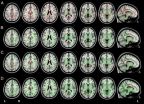INFORMATION:
For media enquiries contact Emily Head in the BJC press office on 020 3469 6189 or, out of hours, on 07050 264 059.
Notes to editor:
* Filomeno et al. Mediterranean diet and risk of endometrial cancer: a pooled analysis of three Italian case-control studies. British Journal of Cancer. DOI: 10.1038/bjc.2015.153
** Endometrial cancer.
About the British Journal of Cancer (BJC)
The BJC is owned by Cancer Research UK. Its mission is to encourage communication of the very best cancer research from laboratories and clinics in all countries. Broad coverage, its editorial independence and consistent high standards have made BJC one of the world's premier general cancer journals. http://www.bjcancer.com
Eating a Mediterranean diet could cut womb cancer risk
2015-05-27
(Press-News.org) Women who eat a Mediterranean diet could cut their risk of womb cancer by more than half (57 per cent), according to a study published today (Wednesday) in the British Journal of Cancer*.
The Italian researchers looked at the diets of over 5,000 Italian women to see how closely they stuck to a Mediterranean diet and whether they went on to develop womb cancer**.
The team broke the Mediterranean diet down into nine different components and measured how closely women stuck to them. The diet includes eating lots of vegetables, fruits and nuts, pulses, cereals and potatoes, fish, monounsaturated fats but little meat, milk and other dairy products and moderate alcohol intake.
Researchers found that women who adhered to the Mediterranean diet most closely by eating between seven and nine of the beneficial food groups lowered their risk of womb cancer by more than half (57 per cent).
Those who stuck to six elements of the diet's components reduced their risk of womb cancer by 46 per cent and those who stuck to five reduced their risk by a third (34 per cent).
But those women whose diet included fewer than five of the components did not lower their risk of womb cancer significantly.
Dr Cristina Bosetti, lead author from the IRCCS-Istituto di Ricerche Farmacologiche, said: "Our research shows the impact a healthy balanced diet could have on a woman's risk of developing womb cancer. This adds more weight to our understanding of how our every day choices, like what we eat and how active we are, affect our risk of cancer."
The study was funded by the Italian Foundation for Cancer Research, the Swiss National Science Foundation and the Swiss League Against Cancer.
Each year in the UK there are around 8,500 new cases of womb cancer, and rates have increased by around half since the early 1990s in Great Britain.
Dr Julie Sharp, Cancer Research UK's head of health information, said: "While we know that getting older and being overweight both increase a woman's risk of womb cancer, the idea that a Mediterranean diet could help reduce the risk needs more research. This is partly because this study was based on people remembering what they had eaten in the past.
"Cancer risk is affected by our age and our genes but a healthy lifestyle can also play a part in reducing the risk of some cancers. Not smoking, keeping a healthy weight, being active, eating healthily and cutting down on alcohol helps to stack the odds in your favour."
ELSE PRESS RELEASES FROM THIS DATE:
Glacier changes at the top of the world
2015-05-27
If greenhouse-gas emissions continue to rise, glaciers in the Everest region of the Himalayas could experience dramatic change in the decades to come. A team of researchers in Nepal, France and the Netherlands have found Everest glaciers could be very sensitive to future warming, and that sustained ice loss through the 21st century is likely. The research is published today (27 May) in The Cryosphere, an open access journal of the European Geosciences Union (EGU).
"The signal of future glacier change in the region is clear: continued and possibly accelerated mass loss ...
False breast cancer alarm has negative impact on health
2015-05-27
The psychological strain of being told that you may have breast cancer may be severe, even if it turns out later to be a false alarm. This is the finding of new research from the University of Copenhagen, which has just been published in the scientific journal Annals of Family Medicine. Researchers call for improving screening accuracy, thus reducing the number of false-positive mammograms.
It was a false alarm. You don't have breast cancer. This ought to be a happy message for women who have been through a mammography screening which initially showed signs of something ...
Imaging test may identify biomarker of Alzheimer's disease
2015-05-27
OAK BROOK, Ill. - Degeneration of the white matter of the brain may be an early marker of specific types of Alzheimer's disease (AD), including early-onset AD, according to results of a new study published in the journal Radiology.
"Alzheimer's is a gray matter disease," said Federica Agosta, M.D., Ph.D., co-author of the study conducted at the Neuroimaging Research Unit, San Raffaele Scientific Institute in Milan, Italy. "However, white matter damage has a central role in how the disease strikes and progresses."
AD is an irreversible, progressive brain disease that ...
The safe use of flavorings in e-cigarettes
2015-05-27
The first practical guide to ensure the safe use of flavourings in e-cigarettes has been published (Regulatory Toxicology and Pharmacology DOI: 10.1016/j.yrtph.2015.05.018).
E-cigarettes and other vaping products contain a nicotine-based liquid that is vapourised and inhaled. There is no combustion so the user inhales vapour, not smoke. This means that e-cigarettes deliver nicotine without smoke toxicants. However, some in the public health community still have expressed concerns over the potential health impacts of flavourings used in e-cigarettes.
This is why the ...
Endoscopic removal of spinal tumor with the patient awake at Rhode Island Hospital
2015-05-27
The spinal tumor grew back. Even though the 16-year old patient endured surgery a year earlier to remove and diagnose the lesion, it was back and its cause unknown. Determined to identify the tumor tissue and set the patient on an appropriate treatment regimen, Albert Telfeian, M.D., a neurosurgeon at Rhode Island Hospital and Hasbro Children's Hospital, performed the first reported case of extracting the tumor endoscopically while the patient was awake and under a local anesthetic. The minimally invasive procedure enabled accurate diagnosis, which evaded multiple physicians ...
Study adds to evidence that increasing dietary fiber reduces the risk of developing diabetes
2015-05-27
New research published today in Diabetologia (the journal of the European Association for the Study of Diabetes) indicates that consuming greater quantities of dietary fibre reduces the risk of developing type 2 diabetes.
Over 360 million people worldwide are estimated to be affected by diabetes, and this number is projected to increase to more than 550 million by 2030, with serious consequences for the health and economy of both developed and developing countries. While previous research has found an association between increased dietary fibre intake and a reduced risk ...
Drug treatment to prevent hip fracture is neither viable nor cost effective
2015-05-27
Professor Teppo Järvinen and colleagues say drug treatment "can achieve at best a marginal reduction in hip fractures at the cost of unnecessary harms and considerable waste of monetary resources." The article is part of The BMJ's Too Much Medicine campaign -- to highlight the threat to human health and the waste of resources caused by unnecessary care.
Worldwide, about 1.5 million hip fractures occur each year. They impose an enormous burden on healthcare resources and, with a growing elderly population, their incidence is predicted to rise.
Before the late ...
New evidence confirms link between newer contraceptive pills and higher clot risks
2015-05-27
The results show that pills containing one of the newer types of progestogen hormone (drospirenone, desogestrel, gestodene, and cyproterone) are associated with an increased risk of VTE than pills containing older progestogens (levonorgestrel and norethisterone).
The researchers, based at the University of Nottingham, say this is "an important clarifying study" that "has sufficient power to provide reliable comparative findings for different formulations of combined oral contraceptives."
About 9% of women of reproductive age worldwide use oral contraceptives, rising ...
Psychedelic drugs should be legally reclassified as they may benefit patients
2015-05-27
James Rucker, a psychiatrist and honorary lecturer at the Institute of Psychiatry, Psychology and Neuroscience, King's College London, describes how these drugs "were extensively used and researched in clinical psychiatry" before their prohibition in 1967.
He explains that many trials of psychedelics published before prohibition, in the 1950s and 1960s, suggested "beneficial change in many psychiatric disorders".
However, research ended after 1967. In the UK psychedelic drugs were legally classified as schedule 1 class A drugs - that is, as having "no accepted medical ...
Penn study links better 'good cholesterol' function with lower risk of later heart disease
2015-05-27
PHILADELPHIA -- HDL is the 'good cholesterol' that helps remove fat from artery walls, reversing the process that leads to heart disease. Yet recent drug trials and genetic studies suggest that simply pushing HDL levels higher doesn't necessarily reduce the risk of heart disease. Now, a team led by scientists from the Perelman School of Medicine at the University of Pennsylvania has shown in a large, forward-looking epidemiological study that a person's HDL function -- the efficiency of HDL molecules at removing cholesterol -- may be a better measure of coronary heart disease ...

